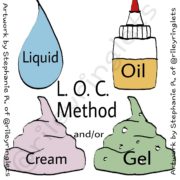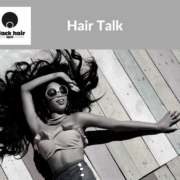Dandruff, Dry Scalp and Cradle Cap – What is it and Why does it happen?
What’s With the Flakes… Is It Dry Scalp or Dandruff?
In almost every culture, dandruff is lumped in with a lack of good hygiene. That’s a dangerous thing! Not just in social terms, but for the health of the scalp, itself. People see flakes and get to scrubbing their scalp with shampoo, sometimes daily, or (horrors!) twice daily. Over time, what happens? If your scalp is sensitive or dry, it is only prone to becoming moreso.
Yet people with dandruff do, indeed, need to shampoo more often than those with dry scalp. The thing is, it’s extra important to know which condition it is when you’re seeing flakes. Seek a dermatologist’s advice if you’re unsure. You don’t want to end up washing dry scalp with shampoo twice a week, right?
Is Dandruff Different From Dry Scalp That’s Itching And Flaking?
There’s a pretty big difference between dry scalp and actual dandruff. A lot of the time, when people think they have dandruff, what they have is a severe form of dry scalp. That’s because when the dryness gets extreme, the outer skin cells die of dehydration on the surface of the scalp. Then flakes begin to fall.
Dandruff is quite a different thing. It can feel like dry scalp and itch like mad, but the formal name for dandruff is Seborrheic Dermatitis, which is yeast-related. When Seborrheic Dermatitis appears in babies, it is referred to as cradle cap. Adult cradle cap, then, is Seborrheic Dermatitis.
This form of dermatitis feeds on the scalp’s natural oil production: its sebum. Sebum is waxy and greasy. So applying wax-based and oily products to the scalp for moisture is a mega no-no here! You’ll be feeding the production of dandruff instead of relieving the itch.
The yeast that triggers dandruff in some people is called malassez and is actually present on everyone’s scalp. Those who have a predisposition to sensitivity for this yeast develop dandruff. So you know, you can’t “get dandruff,” if you’re not predisposed to it – no matter how much malassez yeast is present on your scalp (Journal of Investigative Dermatology).
What Causes Dry Scalp?
It’s weird, though, because even though dry scalp and dandruff are two separate conditions, flaking up happens for many of the same reasons. That’s because a person can have Seborrheic Dermatitis, but won’t necessarily have flare-ups 24/7. Many times, dandruff flare-ups are triggered, just like dry scalp flakes are. Here are the most common reasons why:
- According to Audrey Davis-Sivasothy, author of The Science of Black Hair: A Comprehensive Guide to Textured Hair, a deficiency of B vitamins can cause a predisposition to both dandruff and dry scalp.
- Stress puts your bodily systems under tension, causes some ailments and exacerbates others. If you have itchy scalp, Murphy’s Law likes to play with stress in embarrassing ways: meaning, anything that can go wrong, will go wrong! Have you ever noticed that in the middle of stressful conversations – right when it’s going to look real bad – your scalp starts itching like mad? Stress causes scalp flare-ups.
- Of course, genetics can give you a predisposition to either dry scalp or dandruff. There’s still relief, though. As you’ll see further down in this article.
- Climate can also aggravate symptoms. If you live in a dry climate, the moisture in your scalp is getting whisked away regularly. If your scalp is already dry, this can spell a lot of irritation to your scalp. (One major irritant: flakey, dry, itchy scalp has trouble growing healthy, nourished hair!)
Cold and frigid climates also dry out the scalp, the same way they dry out your skin. A scalp with Seborrheic Dermatitis needs moisture, too. So what happens if it doesn’t get hydration? Your scalp will then increase sebum production when it gets cold, which in turn increases your dandruff! - Too-frequent cleansing, whether it’s with a gentle shampoo, dry shampoo, natural cleanser, cowash formula, conditioner or a vinegar solution… anything that is removing the natural oils from your scalp and hair is going to leave them dry, to some degree or other.
We found that black girls with Seborrheic Dermatitis are able to keep dandruff away by cleansing and exfoliating twice a week. More than that might irritate your scalp, but of course, this depends on the person. If you have dry scalp, once a week is the maximum. - That said, beware of product buildup! Flaking product buildup can mimic dandruff. More importantly if a heavy, wax- or petroleum-based product builds up on the scalp, it can irritate both dry scalp and dandruff.
- Seborrheic Dermatitis makes the scalp highly sensitive: to stress and also to product ingredients. The chemicals, and even some natural ingredients, found in shampoos, conditioners and stylers can irritate the symptoms and cause a dandruff flare-up.
On the other hand, the condition of dry scalp, as well as its symptoms, can be caused by harsh chemical ingredients in hair care products.
Let’s take a closer look, below.
The Traditional Use of Harsh Chemicals (Or Long Live Flakes and Itch)
The products used in traditional styling and care methods of black hair contribute to the discomfort of dandruff and dry scalp. Here are some examples:
- The usual suspects! Permanents in their various forms for black hair: relaxers, Jheri Curls (and offshoots), and texturizers can all adversely affect the scalp. The Department of Dermatology & Venereology College of Health Sciences in Nigeria found varying adverse effects on the hair and scalp after the use of relaxers. (All three permanent variations use similarly harsh chemicals to permanently alter the hair.) Out of 250 participants in a relaxer study, 60 women (24%) suffered from scalp itching/irritation and 37 (14.8%) from dandruff. The study only included women who had relaxers done professionally.
- Shampoos that contain the foaming agents sodium lauryl sulfate, sodium laureth sulfate or similarly drying chemicals tend to be very drying and even irritating. Unfortunately, this includes many popular dandruff shampoos. If you have Seborrheic Dermatitis, some better care choices are included in the next section. There are also many alternatives to shampoo, for those with dry scalp.
- Because Seborrheic Dermatitis is a more complicated form of sensitive scalp, it’s a good idea to steer away from products that have allergy-causing chemicals, period. If you are a research buff, EWG Skindeep is a cosmetic product and ingredient index that rates the toxicity of ingredients and can satisfy your need to know. If you’re not a research buff, we sure are. Check back for more articles on product ingredients.
So How Can You Nix Dry Scalp?
Despite the similarities in how the conditions of dry scalp and dandruff are provoked, the treatments of the two conditions are entirely different.
How to Get Rid of Dry Scalp
If you’re looking for dry scalp remedies, the rule of thumb is to moisturize inside and out. That means:
- Drinking plenty of water
- Fortifying your scalp by using an oil treatment prior to cleansing. Shea butter mixed with a natural oil like sesame is great for this purpose.
- Note! Ever “got dandruff” after applying shea butter to your scalp? Even if lightened up with an oil, shea butter contains oleic acid, which is great for dry scalp. But the yeast that causes Seborrheic Dermatitis loves it, too! So if you have dandruff, stay away from Madame Shea.
- Consuming foods with healthy fats: salmon, avocado and the like. The goodness will make it around to your skin, scalp and hair, too.
- LOC-ing your scalp. Because dry hair is epidemic for us, almost all products made by black companies for our hair are, by default, made to combat dryness. They are very nourishing! When you find a good formula that’s void of drying chemicals, massage it well into your scalp, and afterwards apply it to your hair. If you use the LOC (liquid, oil, cream) method of locking moisture into your hair, don’t forget to the same on your scalp.
If your dry scalp is genetic, you will find relief from using these methods. Still you might not get rid of the dryness completely. A lot depends on the individual person.
Looking to calm Seborrheic Dermatitis? Try anti-fungal ingredients like zinc pyrithione in your care products. This will help lessen the discomfort and flakes.
Here are a few products to try:
Mild Dandruff: Dead Sea Spa MAGIK Mineral Shampoo

https://www.chemistdirect.co.uk/dead-sea-spa-magik-mineral-shampoo/prd-3dh?utm_source=blackhairspot.com&utm_medium=referral&utm_campaign=BHS-Blog-Post-Links&utm_term=BHS-Term&utm_content=BHS-Content
This product has salicylic acid, to aid exfoliation, and zinc pyrithione, which is antifungal. The shampoo is for mild dandruff.
Moderate Dandruff: BIOM8 – Skin Conditioning Oil

https://www.biom8.com/?utm_source=blackhairspot.com&utm_medium=referral&utm_campaign=BHS-Blog-Post-Links&utm_term=BHS-Term&utm_content=BHS-Content
This is an all natural, oil-based product that is anti-fungal in nature. It’s great for moderate Seborrheic Dermatitis of the scalp or skin. Most anti-dandruff products are very drying, and therefore best to be used sparingly. Because this is an anti-fungal, moisturizing oil, it’s great for Seborrheic Dermatitis. It’s even perfect to use as a dry scalp treatment.
Severe Dandruff: Extina® (ketoconazole) Foam, 2%

http://www.dermatologypro.com/Products?utm_source=blackhairspot.com&utm_medium=referral&utm_campaign=BHS-Blog-Post-Links&utm_term=BHS-Term&utm_content=BHS-Content
Ketoconazole is also very effective against severe cases of dandruff. It is available by prescription as a leave-in foam, so you won’t have to wash your hair more frequently than our hair and scalp can tolerate. It was developed for black women as an alternative prescription to ketoconazole 2% shampoo. Like the shampoo, this foam still requires twice daily usage.
Despite the similarities in how the conditions of dry scalp and dandruff are provoked, the treatments of the two conditions are entirely different. #bhs #hairtreatment Share on XRecap and… Quiz!
To recap, dandruff and dry scalp are very different conditions; although, both might give you flakes and itching.
- Technically, dandruff is Seborrheic Dermatitis – basically a yeast allergy. You have to have a predisposition to it, either because of genetics or due to a vitamin deficiency. You can’t “get dandruff.”
- Dry scalp, on the other hand, can also be genetic or even climate-based. But there are many things you can do to alleviate it or get rid of it entirely. This depends on the person.
If you look after your scalp consistently, with knowledge and care, you will see a difference in its health. This will also positively affect the hair that grows out of your scalp.
Okay, it’s quiz time everyone! Listen to what vlogger JustJamiexo says about how cowashing affects her scalp. Would you guess that her flakes are due to dry scalp… or dandruff? (Hint: The vlogger says she must cleanse with a stripping, sulfate shampoo.)
Post your answer in the comments, and visit us again for more learning fun!
Does your baby have cradle cap? If so he/she also might have eczema cropping up, too. Why? Seborrheic Dermatitis is the same as Seborrheic Eczema, according to the New Zealand Dermatological Society. Ignore the haters. It’s not that your baby is dirty! It’s a predisposition to yeast sensitivity. And don’t let auntie so-and-so give him a lollipop, either. Cradle cap can be triggered by sugar (wink).







What are your thoughts on Soapnut shampoo? I created my own and have been using it since past 2 years! No dandruff, no hairfall and my hairs have never looked better.
Misha